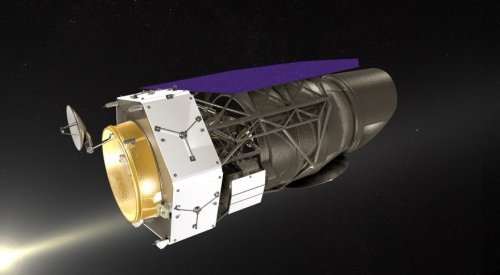WASHINGTON — The Trump administration is offering $19.6 billion for NASA in its fiscal year 2019 request, while seeking to cancel a flagship astronomy mission and end NASA funding of the International Space Station in 2025.
A key cut included in the proposal, released Feb. 12, is cancelling the Wide-Field Infrared Survey Telescope (WFIRST), the agency’s next flagship astrophysics mission after the James Webb Space Telescope. NASA had been in the midst of revising the mission’s design to lower its costs from an estimated $3.9 billion to $3.2 billion.
“Development of the WFIRST space telescope would have required a significant funding increase in 2019 and future years, with a total cost of more than $3 billion,” the White House Office of Management and Budget (OMB) stated in a document outlining planned cuts across the overall federal budget proposal. “Given competing priorities at NASA, and budget constraints, developing another large space telescope immediately after completing the $8.8 billion James Webb Space Telescope is not a priority for the Administration.”
OMB said it would it would instead redirect funding from WFIRST, which received $105 million in fiscal year 2017, “to other priorities of the science community, including completed astrophysics missions and research.” The document didn’t state how much of that planned funding would be redirected, but stated that funding for JWST, scheduled for launch next year, would be maintained.
The budget also seeks to cancel five Earth science missions that were proposed for cancellation in 2018: Radiation Budget Instrument (RBI); Plankton, Aerosol, Cloud, ocean Ecosystem (PACE); Orbiting Carbon Observatory-3 (OCO-3); Deep Space Climate Observatory (DSCOVR) Earth-viewing instruments; and Climate Absolute Radiance and Refractivity Observatory (CLARREO) Pathfinder. A House version of the fiscal year 2018 spending bill supported those cuts, while the Senate version restored funding for those programs. A final 2018 appropriations bill has not been completed by Congress.
The budget proposal for 2019 also attempts again to close NASA’s Office of Education, saving $100 million. That proposal in 2018 faced strong bipartisan opposition in Congress.
The proposal, as expected, includes plans to end NASA funding of the ISS in 2025. It offers $150 million to “begin support for commercial partners to encourage development of capabilities that the private sector and NASA can use” as successors to the station.
The budget also calls for the commercial launch in 2022 of a “key power and propulsion space tag” that could serve as a core element of NASA’s proposed Deep Space Gateway. NASA had previously proposed launching the element as a secondary payload on the second Space Launch System mission, now expected to take place no sooner than 2023.
To support the administration’s plans for a human return to the moon, the budget adds a new lunar robotic exploration program that “would support innovative approaches to achieve human and science exploration goals,” including transportation services, rovers and experiments. It also includes an Exploration Research and Technology program line to “to enable lower-cost technology and systems needed to sustainably return humans to the Moon and beyond.”
While Earth science programs at NASA would face cuts, planetary science would see an increase to $2.2 billion. That level includes $50 million to begin studies of a Mars sample return mission and $150 million for planetary defense.
That overall spending request of $19.6 billion may be augmented by the administration. In a Feb. 12 letter to House Speaker Paul Ryan, OMB Director Mick Mulvaney said the administration will offer some additional funding to selected non-defense discretionary programs in light of a two-year budget deal reached by Congress last week that raises spending caps. In the case of NASA, that includes $300 million “to fund innovative exploration-related programs” and other agency needs, which he did not specify.
The budget proposal is already facing opposition from key members of Congress. “The administration’s budget for NASA is a nonstarter. If we’re ever going to get to Mars with humans on board and return them safely, then we need a larger funding increase for NASA,” said Sen. Bill Nelson (D-Fla.), ranking member of the Senate Commerce Committee, in a statement immediately after the OMB released the budget.
He reiterated previous criticism calling for an end to NASA funding of the ISS in 2025. “Turning off the lights and walking away from our sole outpost in space at a time when we’re pushing the frontiers of exploration makes no sense.”
- SN Military.Space | Vice Chief Selva: With no budget ‘We’re gambling’ – Why it’s hard to defend space – Space industry adapts to changing market
- SpaceX takes top honors in SpaceNews Awards for Excellence & Innovation
- Space community lines up in support of National Space Council
- Space Corps proposal becoming flashpoint in DoD budget negotiations
- The Moon is the gateway to NASA’s exploration future
Share with your friends

(0) Comments
This article comments are currently no :(